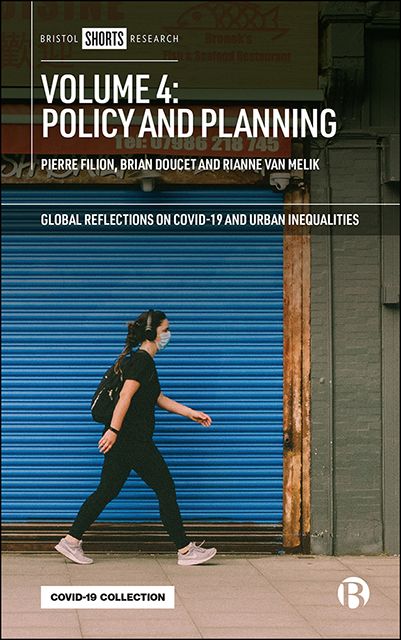Book contents
- Frontmatter
- Contents
- List of Figures and Tables
- Notes on Contributors
- Acknowledgments
- Preface to All Four Volumes of Global Reflections on COVID-19 and Urban Inequalities
- One Introduction: Policy Making in the Face of Uncertainty and Inequality
- Part I COVID-19 and Urban Changes
- Part II The Pandemic, Social Inequality, and Mobilization
- Part III Municipal and Urban Policy Responses
- Index
One - Introduction: Policy Making in the Face of Uncertainty and Inequality
Published online by Cambridge University Press: 25 April 2023
- Frontmatter
- Contents
- List of Figures and Tables
- Notes on Contributors
- Acknowledgments
- Preface to All Four Volumes of Global Reflections on COVID-19 and Urban Inequalities
- One Introduction: Policy Making in the Face of Uncertainty and Inequality
- Part I COVID-19 and Urban Changes
- Part II The Pandemic, Social Inequality, and Mobilization
- Part III Municipal and Urban Policy Responses
- Index
Summary
Introduction
In The War of the Worlds, H.G. Wells (1898) describes the superiority of the Martian assailants over the organization and technology Earth's civilizations can deploy against them. All the military prowess on Earth fails to dent the invasion. And then, out of the blue, the apparently invincible attack vanishes. Martians have been overcome by a silent and invisible enemy; a deadly epidemic caused by bacteria, which achieved what all the powers of Earth's civilizations could not. Invading powers are brought to their knees by a microscopic infectious agent. Like the invaders, the COVID-19 pandemic has seemed to be able to overwhelm nearly all the policies adopted to contain it. In the process, the pandemic brings to light flaws in governments’ policy making and fractures running through societies. This time, it is not the Martians whom Earth's civilizations appear unable to defeat, but the type of microscopic agent (albeit in this case a virus rather than bacteria) that destroyed the Martians in the novel.
Public policy challenges
The still relatively short history of government reactions to the COVID-19 pandemic is one of policy making in a time of uncertainty. The policy landscape is in a state of flux. The unfolding of the pandemic remains largely unpredictable; it flares up, seems to come under control for some time and then peaks again at an unprecedented level. But it is fair to say that, until now, it is generally the most pessimistic contagion scenarios that have materialized (Roberts, M. 2020). At the same time, knowledge on COVID-19 progresses, causing changes in the perception of the disease and of the likely future of the pandemic. We know more about transmission, the different forms the disease can take, and its long-term health consequences (Rees, 2020). As a result, public health guidelines have varied over time, causing skepticism in some constituencies about directives intended to contain contagion. Finally, public opinion about the pandemic and policy responses also changes over time, which affects compliance with sanitary guidelines (Bosman et al, 2020). At the time of writing, vaccines are raising hope about a foreseeable ending of the pandemic. Yet, questions remain. Will the vaccines be able to tackle over the medium and long term a mutating virus?
- Type
- Chapter
- Information
- Volume 4: Policy and Planning , pp. 1 - 12Publisher: Bristol University PressPrint publication year: 2021



